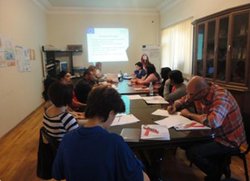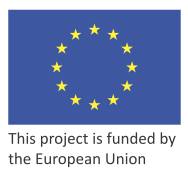 One of the key objectives of Cross Border Cooperation for HIV/AIDS Prevention and Impact Mitigation in Southern Caucasus and Russian Federation Project is establishing partnership and collaborative relationships with the NSAs and GOs participating in joint national and regional actions and sharing experience in various activities of HIV/AIDS Prevention, Care and Treatment.
One of the key objectives of Cross Border Cooperation for HIV/AIDS Prevention and Impact Mitigation in Southern Caucasus and Russian Federation Project is establishing partnership and collaborative relationships with the NSAs and GOs participating in joint national and regional actions and sharing experience in various activities of HIV/AIDS Prevention, Care and Treatment.
During the process of drafting a Country Level HIV/AIDS Advocacy Acton Plan project team confirmed partnership with the representatives of the “State Employment Service” Agency Regional Centers and Migration Resource Centers of the Ministry of Labor and Social Affairs, owing to the fact that those are the establishments, which work directly with the migrant population. This idea was proposed by the project stakeholders from IOM; the mentioned structures provide individual and group counseling and conduct discussions with potential or returning migrants, posing inquiries on various aspects of migration, e.g. legislation, procedures how to acquire the official permit to reside and work in host countries, etc.
Project team addressed a number of meetings at the State Employment Agency and Migration Resource Center located in one of the districts of Yerevan. The meetings were held with the Head of State Employment Agency and Migration Resource Center staff; during the given meetings the team briefly presented the project, emphasized the linkages of HIV and Migration, and proposed cooperation in upcoming activities. Afterwards the team visited the head office of State Employment Service Agency, conducted meetings with respective point persons and acquired confirmation to organize capacity building sessions for the staff of the mentioned institution on miscellaneous aspects of HIV and Migration.
The capacity building sessions were delivered in two 2-day workshops in Yerevan and Gavar. The biggest part of the trainings was concentrated on interactive discussions on the exacerbated risks and hazards of HIV and other health problems among the migrants in destination countries, particularly Russia and Ukraine. The representatives of Migration Resource Centers confessed possessing a very little knowledge on HIV issues and expressed their willingness to include HIV related topics in their work with migrants. RWRP team suggested raising the migrants’ awareness on HIV/AIDS by incorporating the training sessions with the Migration Resource Centers’ meetings with their beneficiaries. Project team promised to provide the partners with printed and video materials on HIV/Migration issues, which would be afterwards presented and distributed during the counseling sessions for migrants.
Incorporating the HIV component in different activities of Migration Resource Centers may play a crucial part in HIV prevention among migrant populations and in the best-case scenario will lead to the change of migrants’ behavior in destination countries.
Lasting partnership and cooperation with similar NSAs, GOs and other stakeholders will not only contribute to the achievement of project goal, but also lead to sustainable and efficient outcomes, resulting in effective national and/or regional joint actions for improving HIV Prevention, Care and Treatment Services, especially from the perspective of migration.
One of the key objectives of Cross Border Cooperation for HIV/AIDS Prevention and Impact Mitigation in Southern Caucasus and Russian Federation Project is establishing partnership and collaborative relationships with the NSAs and GOs participating in joint national and regional actions and sharing experience in various activities of HIV/AIDS Prevention, Care and Treatment.
During the process of drafting a Country Level HIV/AIDS Advocacy Acton Plan project team confirmed partnership with the representatives of the “State Employment Service” Agency Regional Centers and Migration Resource Centers of the Ministry of Labor and Social Affairs, owing to the fact that those are the establishments, which work directly with the migrant population. This idea was proposed by the project stakeholders from IOM; the mentioned structures provide individual and group counseling and conduct discussions with potential or returning migrants, posing inquiries on various aspects of migration, e.g. legislation, procedures how to acquire the official permit to reside and work in host countries, etc.
Project team addressed a number of meetings at the State Employment Agency and Migration Resource Center located in one of the districts of Yerevan. The meetings were held with the Head of State Employment Agency and Migration Resource Center staff; during the given meetings the team briefly presented the project, emphasized the linkages of HIV and Migration, and proposed cooperation in upcoming activities. Afterwards the team visited the head office of State Employment Service Agency, conducted meetings with respective point persons and acquired confirmation to organize capacity building sessions for the staff of the mentioned institution on miscellaneous aspects of HIV and Migration.
The capacity building sessions were delivered in two 2-day workshops in Yerevan and Gavar. The biggest part of the trainings was concentrated on interactive discussions on the exacerbated risks and hazards of HIV and other health problems among the migrants in destination countries, particularly Russia and Ukraine. The representatives of Migration Resource Centers confessed possessing a very little knowledge on HIV issues and expressed their willingness to include HIV related topics in their work with migrants. RWRP team suggested raising the migrants’ awareness on HIV/AIDS by incorporating the training sessions with the Migration Resource Centers’ meetings with their beneficiaries. Project team promised to provide the partners with printed and video materials on HIV/Migration issues, which would be afterwards presented and distributed during the counseling sessions for migrants.
Incorporating the HIV component in different activities of Migration Resource Centers may play a crucial part in HIV prevention among migrant populations and in the best-case scenario will lead to the change of migrants’ behavior in destination countries.
Lasting partnership and cooperation with similar NSAs, GOs and other stakeholders will not only contribute to the achievement of project goal, but also lead to sustainable and efficient outcomes, resulting in effective national and/or regional joint actions for improving HIV Prevention, Care and Treatment Services, especially from the perspective of migration.


18.12.2012
